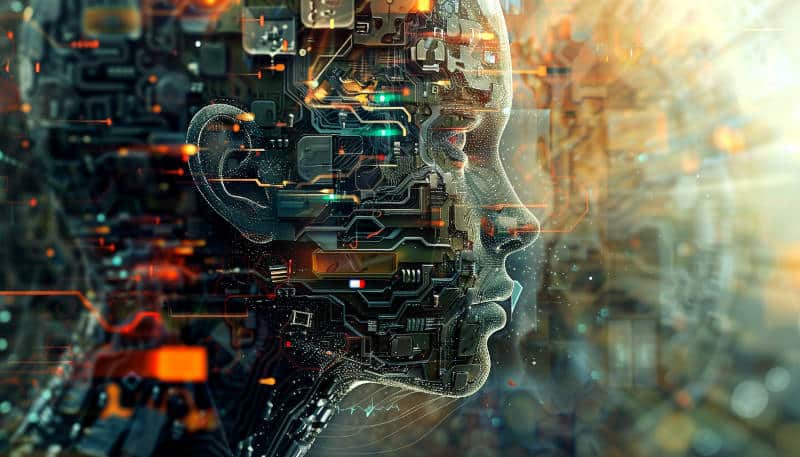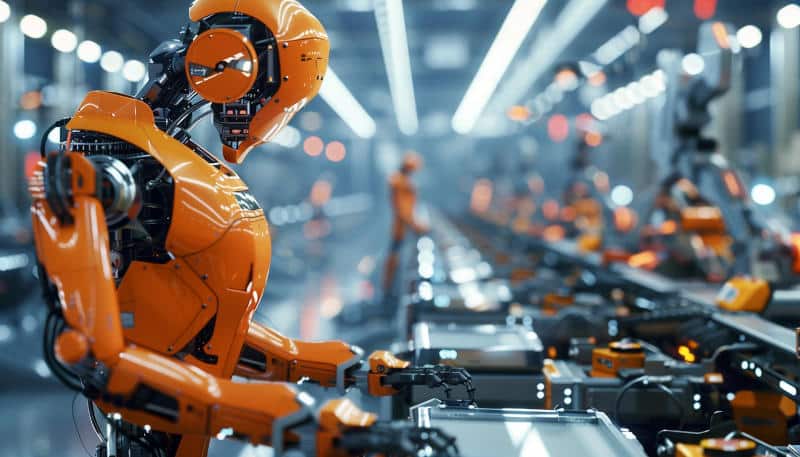Cybernetics is a science at the intersection of technology, biology, and social sciences, shaping our understanding of complex systems and transforming our world at breakneck speed. Discover its history, current applications, and future prospects!
Imagine a world where machines can think, adapt, and evolve, where biological and technological systems interact seamlessly and harmoniously. This is the vision of a transdisciplinary science conceived in the 1940s by mathematician Norbert Wiener: cybernetics. Since its inception, it has profoundly influenced various scientific and technological fields, from control theory to biology and AI, leading to countless advances.
More than just its technological impact, cybernetics has reshaped our understanding of complex systems by surpassing traditional compartmentalized approaches. In today’s digital and intricately complex society, the cybernetic perspective remains highly relevant.
Back to the origins of cybernetics
Cybernetics first emerged amidst the chaos of World War II, marking the beginning of numerous scientific and technological breakthroughs. American mathematician and philosopher Norbert Wiener explored how machines could mimic aspects of human thought, such as rapid decision-making and error correction. Influential works by Claude Shannon on information theory and John Von Neumann on automata theory also contributed to the foundation of cybernetics, focusing on the parallels between living organisms’ regulatory mechanisms and intelligent artificial systems.
What are the fundamental principles?

At its core, cybernetics is built on key principles applicable across biological, mechanical, or social systems. It views systems as black boxes—entities whose inputs, outputs, and behaviors are analyzed without delving into their intricate internal mechanisms.
The pivotal role of information theory in cybernetics, devised by Claude Shannon, enables the quantification and analysis of information transmission and processing within communication systems. Essential to cybernetic systems is efficient and reliable information exchange, whether through electrical signals, chemical interactions, or social exchanges, depending on the system’s nature.
Central to cybernetics are the concepts of feedback and regulation, which allow systems to self-adjust and maintain dynamic equilibrium based on the feedback from their own outputs. An example is a smart thermostat that automatically regulates room temperature by activating or deactivating heating in response to real-time temperature readings.
Understanding complex behaviors is critical in cybernetics for grasping the emergent behaviors of systems, which are not easily inferred from the properties of their individual components.
Robotics, biology, social sciences... the fields of application
Cybernetics has propelled advancements across a wide array of fields. In artificial intelligence, it has led to the creation of expert systems, neural networks, and machine learning technologies aiming to replicate human intelligence facets. Through feedback and regulation, algorithms and computer systems can adapt and improve, such as neural networks adjusting connection weights based to feedback loops.
For biology and cognitive sciences, cybernetics has illumined the regulatory mechanisms in living organisms and enhanced our understanding of nervous and cognitive systems. Biocybernetics specifically examines biological systems as interconnected regulatory networks, with applications in medicine spanning from smart prosthetics to real-time adjustable implantable devices like pacemakers.
In social, economic, and organizational domains, cybernetic principles facilitate modeling of decision-making processes and feedback mechanisms, aiding in the management and efficiency of systems. Cybernetics offers frameworks for understanding and optimizing how societies, markets, and organizational structures function and evolve.

Significant challenges and issues to address
The rise of autonomous and intelligent cybernetic systems prompts ethical discussions on responsibility, privacy, and potential misuse. Beyond technological considerations, the human relationship with machines and complex systems is a topic of ongoing debate, challenging assumptions about life, cognition, and societal paradigms.
The shift towards automation and AI raises concerns about job displacement, while also creating opportunities in new sectors. Questions about cybernetics’ universal applicability and its sometimes abstract nature continue to spark discussions within the scientific and philosophical communities.
It’s evident that technological advancements must be accompanied by ethical deliberations, ensuring innovations align with societal values like human dignity and social justice.
Recent advancements and the future of cybernetics
Today, cybernetics influences emerging technologies such as the Internet of Things (IoT) and advanced robotics, where devices and systems communicate and self-regulate independently. Autonomous vehicles and cyber-physical systems demonstrate the application of cybernetic principles in real-time decision-making and behavioral adjustments to environmental changes.
The future promises significant developments in AI, where systems may achieve unprecedented levels of autonomy and self-learning. Integrating AI with cybernetics could lead to intelligent machines capable of complex decision-making and real-time adaptation. In healthcare, biocybernetics is poised to revolutionize personalized treatment approaches with advanced, more effective medical devices.
The integration of cybernetics with virtual and augmented reality technologies may transform our digital interactions, while its application in smart cities aims to optimize urban infrastructure for better energy use, waste management, and mobility.

Conclusion: Cybernetics, a science redefining Human-Machine interaction
Originating from the Greek “kybernetes” for “helmsman” or “pilot,” cybernetics stands as a guiding force towards a new era of understanding and innovation in complex systems. This transdisciplinary field continues to adapt and address the challenges of increasingly complex societal, technical, and natural systems.
With ongoing advancements in AI, Big Data, and IoT, cybernetics offers exciting prospects for mastering complex future systems. Through programs like DataScientest’s distance learning, individuals can gain the knowledge and skills to navigate the evolving landscape of AI and cybernetics, preparing for a future where interdisciplinary expertise is key.
Now that you have a comprehensive overview of cybernetics, delve deeper into related topics such as expert systems and generative AI to explore the full potential of this fascinating field.










